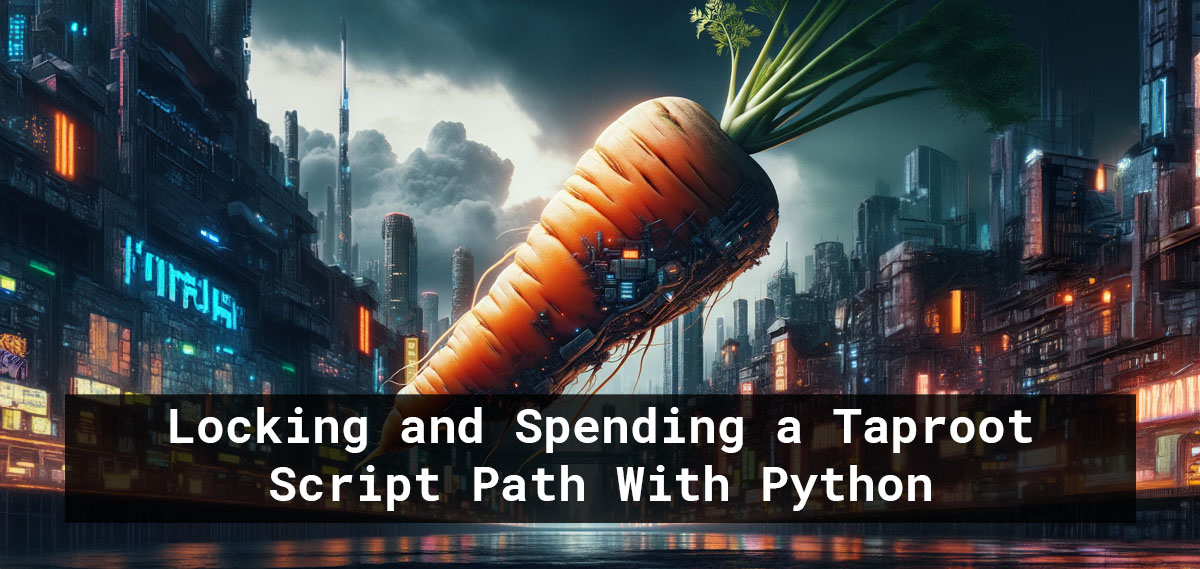
Learn how to lock your funds in Python using Taproot and spend them using Taproot script path transaction. This guide is a continuation of Stupid Simple Locking Script With Python where we learned how to lock our funds using a P2SH address.
Pre-requisites:
- basic knowledge of taproot and its phrases (tapleaf, tapbranch, control block, internal pubkey,...)
buidlorbitcointxpython library- running or having access to regtest node
Instead of defining only one way of spending the locked sats, we'll define 3 equations and the solution to any of the equation will unlock the funds.
Script used in this article is for educational purposes only, please don't be a degen and use this with real money.
Here are the equations that we will use:
- Script A: x + 1 = 2
- Script B: x + 2 = 4
- Script C: x + 1 = 5
Each equation is its own script and is "wrapped" in a TapLeaf. When there are multiple scripts defined we wrap those into branches called TapBranch. See the below diagram as an example:
Below we use two Python libraries to demonstrate how to create and spend a P2TR script path:
Create a locking address
As explained in the previous section, here we will construct an address that locks its funds that will only be spendable if any of the 3 mathematical equations get solved.
- bitcointx
- buidl
import bitcointx as btc
# `select_chain_params` must be run before other imports!
btc.select_chain_params("bitcoin/regtest")
from bitcointx.wallet import CCoinKey
from bitcointx.core import COutPoint, CTxIn, CTxOut, CMutableTransaction, CTxInWitness, b2x, lx, CTxWitness
from bitcointx.core.script import CScript, OP_ADD, OP_1, OP_2, OP_4, OP_5, OP_EQUAL, TaprootScriptTree, CScriptWitness
from bitcointx.wallet import P2TRCoinAddress, P2WPKHBitcoinRegtestAddress
from binascii import hexlify, unhexlify
# define the 3 spending equations
script_a = CScript([OP_1, OP_ADD, OP_2, OP_EQUAL], name="a")
script_b = CScript([OP_2, OP_ADD, OP_4, OP_EQUAL], name="b")
script_c = CScript([OP_1, OP_ADD, OP_5, OP_EQUAL], name="c")
# bitcointx will build a tree of branches and leaves for you
tree = TaprootScriptTree([script_a, script_b, script_c])
# create a provably unspendable public key in order to
# make the coins spendable ONLY using the script path
internal_pubkey = CCoinKey.from_secret_bytes(unhexlify("50929b74c1a04954b78b4b6035e97a5e078a5a0f28ec96d547bfee9ace803ac0")).xonly_pub
tree.set_internal_pubkey(internal_pubkey)
addr = P2TRCoinAddress.from_script_tree(tree)
print("Send 0.01 BTC to the following address: {}".format(addr))
# prints: Send 0.01 BTC to the following address: bcrt1p6zvv97wg8j0hec7uhatuaqtqksj88wqk0xqq8q98fr9zt4ecy4hqwgv6k2
from buidl.ecc import S256Point
from binascii import unhexlify
from buidl.taproot import TapLeaf, TapBranch, TapScript
from buidl.op import encode_num
from buidl.tx import Tx, TxIn, TxOut
from buidl.script import P2WPKHScriptPubKey, decode_bech32
# script_a = Script([op_1, op_add, op_2, op_equal])
# script_b = Script([op_2, op_add, op_6, op_equal])
# script_c = Script([op_2, op_add, op_3, op_equal])
# buidl doesn't have constants/variables defined for op codes hence why
# we use use their integer values
script_a = TapScript([81, 147, 82, 135])
script_b = TapScript([82, 147, 84, 135])
script_c = TapScript([81, 147, 85, 135])
leaf_a = TapLeaf(script_a)
leaf_b = TapLeaf(script_b)
leaf_c = TapLeaf(script_c)
# we need to construct a tree of branches ourselves
branch_bc = TapBranch(leaf_b, leaf_c)
branch_abc = TapBranch(leaf_a, branch_bc)
internal_pubkey = S256Point.parse_xonly(unhexlify("50929b74c1a04954b78b4b6035e97a5e078a5a0f28ec96d547bfee9ace803ac0"))
addr = internal_pubkey.p2tr_address(branch_abc.hash(), network="regtest")
print("Send 0.01 BTC to the following address: {}".format(addr))
# prints: Send 0.01 BTC to the following address: bcrt1py7e8e0q7pdkxwyp2tjn65k4kd5kgch0aqe03jzjczn96xat6nwjswsu892
After getting an address, send 0.01 BTC to it. In the next step, we'll solve one of the equations and spend those funds.
We use a provably unspendable public key (public key without a private key) 50929b74c1a04954b78b4b6035e97a5e078a5a0f28ec96d547bfee9ace803ac0
to enforce that the locked Bitcoins can only be spent by solving a mathematical equation and not also by using
a keypath spend path. A more detailed and technical explanation can be found in BIP-341.
Unlock and spend funds
In this example, we will unlock the funds by solving the 2nd mathematical equation (x + 2 = 4). In order to unlock
the funds we must provide a value X. After doing some "heavy maffs", we realize that x = 2`.
This means that when constructing our spending transaction we must:
- provide the answer to the equation (x=2)
- provide the script that we are spending (
script_b) - provide a control block (the control block contains the Merkle tree path to the leaf we're using to unlock the coins)
- bitcointx
- buidl
# set the new destination address
destination_address = P2WPKHBitcoinRegtestAddress('bcrt1q2h6auzh30jxlq5q3az2wzmfa5zx9nu9rqnn4v0')
# get the txid and index of the transaction that funded the
# address which we generated above
txid = "d78b711e00e15683e4344a2e21f4fc46d0a3148640181616bf8533b92b76c169"
vout = 1
# construct a spending transaction
script, control_block = tree.get_script_with_control_block('b')
txin = CTxIn(COutPoint(lx(txid), vout))
txout = CTxOut(998000, destination_address.to_scriptPubKey())
tx = CMutableTransaction([txin], [txout])
# we pass the encoded num 2 (x + 2 = 4; x = 4 - 2; x = 2) which is the answer
# to script b that we are using to unlock the funds
ctxinwitnesses = [CTxInWitness(CScriptWitness([2, script, control_block]))]
tx.wit = CTxWitness(ctxinwitnesses)
print("Serialized transaction, ready to be broadcasted: \n{}".format(b2x(tx.serialize())))
# prints: Serialized transaction, ready to be broadcasted:
# 0200000000010169c1762bb93385bf161618408614a3d046fcf4212e4a34e48356e1001e718bd70100000000ffffffff01703a0f000000000016001455f5de0af17c8df05011e894e16d3da08c59f0a3030102045293548761c01e2cd43aa1993fa0c794bdb6d46bf020b8ac8e94b4ba8ef0afdf4bc7e7c69a18d1e739a26b4901006173fdaabda58fee852adf52961b72599c9028bc3c2416726d44bd01a69b7813aa96283e235ae783e12e45017e8368bce37cec085d5b823d00000000
# set the new destination address
destination_address = "bcrt1qjpy5vd3au8evkh8y88j76quyjgz3kfu9p2yqkc"
# get the txid and index of the transaction that funded the address which we generated above
txid = "113617f7090edd587364c57a16fa3102288cdc1dd083f47f50d3ae94cb48a812"
vout = 0
control_block = branch_abc.control_block(internal_pubkey, leaf_b)
tx_in = TxIn(bytes.fromhex(txid), vout)
# we pass the encoded num 2 (x + 2 = 4; x = 4 - 2; x = 2) which is the answer
# to script b that we are using to unlock the funds
tx_in.witness.items = [encode_num(2), leaf_b.tap_script.raw_serialize(), control_block.serialize()]
tx_ins = [tx_in]
tx_outs = [TxOut(998000, P2WPKHScriptPubKey(decode_bech32(destination_address)[2]))]
tx = Tx(2, tx_ins, tx_outs, network="regtest", segwit=True)
print("Serialized transaction, ready to be broadcasted: \n{}".format(tx.serialize().hex()))
# prints: Serialized transaction, ready to be broadcasted:
# 0200000000010112a848cb94aed3507ff483d01ddc8c280231fa167ac5647358dd0e09f71736110000000000ffffffff01703a0f0000000000160014904946363de1f2cb5ce439e5ed038492051b2785030102045293548761c1f006a18d5653c4edf5391ff23a61f03ff83d237e880ee61187fa9f379a028e0ad1e739a26b4901006173fdaabda58fee852adf52961b72599c9028bc3c2416726d44bd01a69b7813aa96283e235ae783e12e45017e8368bce37cec085d5b823d00000000
You should be able to broadcast the above raw transaction and spend the locked funds!
Not sure if you've noticed, but we did not have to sign the transaction, this is because we intentionally only wanted to lock our funds by a stupid simple mathematical equation.